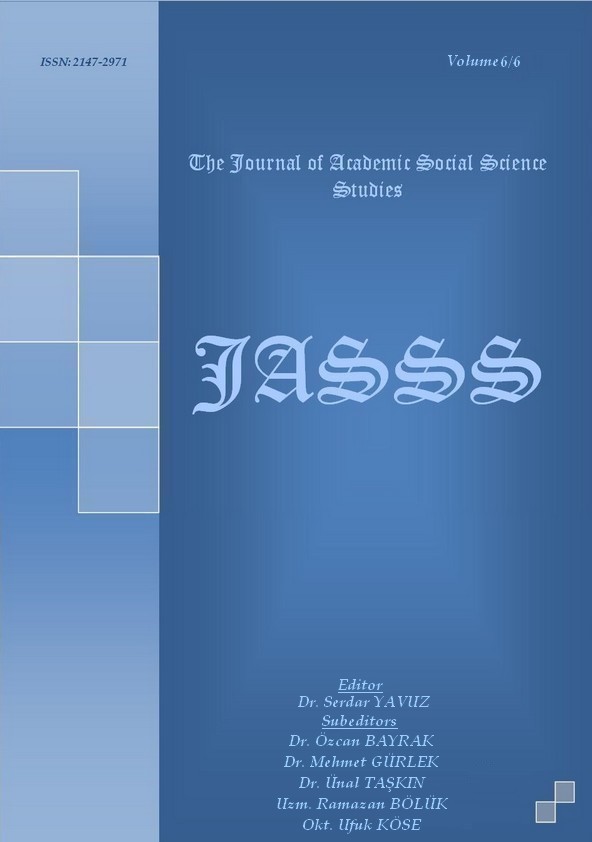Author :
Abstract
Eğitim her millet için her zaman çok önemli olmuştur. Eğitimin temel amacı, yaratıcı ve keşfedici erkek ve kadınlar yetiştirmektir. Eğitimin ikinci amacı ise, eleştirel olabilen ve kendisine sunulan her şeyi hemen kabul etmeyen zihinler oluşturmaktır. Bu amaçlar dolayısıyla, öğretmenlik mesleği çok önemlidir. Diğer taraftan, öğretmen adaylarının, öğrenme sürecinde meslekleri ile ilgili özgüven kazanmaları amacıyla değişik öğretim faaliyetlerine katılmaları gerekmektedir. Bu aktiviteler, öğretmen adaylarının özgüvenlerinin gelişmesini ve özyeterliklerinin artmasını sağlayacaktır. Böylece, özgüven sahibi öğretmenler, öğrencilerin ilgilerinin çekilmesi ve sınıfın sıkıcı bir havadan kurtarılması gibi eğitimde istenilen hedeflerin elde edilmesinde daha başarılı olacaklardır. Bu araştırmanın amacı, Ankara Üniversitesi, İlahiyat Fakültesi, Din Kültürü ve Ahlak Bilgisi Öğretmenliği Bölümünde öğrenim gören din kültürü ve ahlak bilgisi öğretmen adaylarının özyeterlik düzeylerini belirlemek ve bu düzeyin cinsiyet ve lise mezuniyetine göre değişip değişmediğini belirlemektir. Çalışma, genel tarama modelinde yürütülmüştür. Araştırmada, “Özyeterlik Ölçeği” ve araştırmacı tarafından geliştirilen “Kişisel Bilgi Formu” kullanılmıştır. Verilerin analizinde “tek yönlü varyans analizi”, “bağımsız örneklemler t-testi” ve SPSS 16.0 Paket Programı’ndan yararlanılmıştır. Özyeterlik ölçeği 18 maddeden oluşan beşli likert tipi bir ölçektir. Ölçeğin güvenirlik değeri .81’dir. Araştırma sonunda, öğretmen adaylarının çoğunlukla yüksek bir özyeterliğe sahip olduğu, mesleki açıdan kendilerine güvendikleri ve din kültürü ve ahlak bilgisi öğretiminde yeterlik sahibi olduklarını düşündükleri tespit edilmiştir.
Keywords
Abstract
Education has always been very important for every nation. The principal goal of education is to create men and women who are creative and discoverers. The second goal of education is to form minds which can be critical and not accept immediately everything they are offered. Because of these goals, teacher profession is so crucial. On the other hand, it is necessary to make the applicant teachers participate in learning process with various activities for improving their self confidence. These activities will cause applicant teachers to develop their self-reliance and to increase their self-sufficiency. So, teachers with high self-confidence will become more successful in achieving the desires goals of education as they can rescue the course from a boring atmosphere and draw students attention. The aim of the research is to determine religious culture and ethics student’ levels of self-efficacy at Ankara University, Faculty of Theology, Department of Religious Culture and Ethics Teaching and to determine whether this levels changing with gender and the type of the high school graduation or not. General scanning method was performed in this study. In the research, “Self-efficacy Scale” and “Personal Information Form” developed by the researcher were used. In the analysis of data, it was benefited from “One Way Analysis of Variance”, “Independent Simple t-Test” and “SPSS 16.0” in order to analyses data. Self-efficacy Scale is five point lykert-type scale including 18 items. The value of the overall reliability of the scale is .81. At the end of the research, it was found that the applicant teachers had the high self-efficacy level to teach Religious Culture and Ethics, that they generally had confidence in themselves and that they believed they had the required qualifications to teach Religious Culture and Ethics at primary schools.





